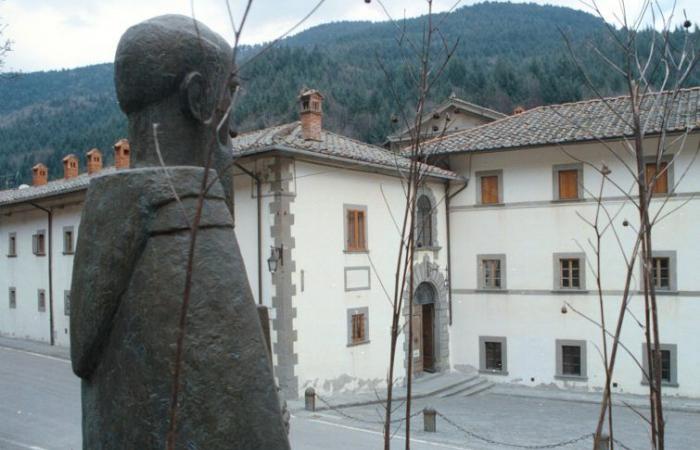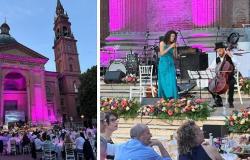The theme chosen for the 50th Social Week to be held in Trieste from 3 to 7 July – “At the heart of democracy. Participating between history and future” – offers the opportunity to revisit the path of Italian Catholics in the unitary state. Among the tools that can facilitate in-depth study of the topic, there is the volume published by Vita e Pensiero, “From Camaldoli to Trieste. Catholics and democracy: to continue the journey” by Ernesto Preziosi
The theme chosen for the 50th Social Week which will be held in Trieste from 3 to 7 July – “At the heart of democracy. Participating between history and future” – offers the opportunity to revisit the path of Italian Catholics in the unitary state. Among the tools that can facilitate in-depth study of the topic, there is the volume published by Vita e Pensiero, “From Camaldoli to Trieste. Catholics and democracy: to continue the journey” Of Ernesto Preziosi.
(Photo Life and Thought)
The text offers a quick overview of the path taken by Italian Catholics in their relationship with democracy. A path that goes from extraneousness, following the Risorgimento season and interpreted by the “non expedit”, to the confrontation that takes place at the beginning of the 20th century, with the contributions of Giuseppe Toniolo, Romolo Murri and Luigi Sturzo, and to the foundation of the Party Popular in 1919, until after the Second World War when, with the Resistance to Nazi-Fascism, a new season began which saw the birth of the De Gasperian DC.
An intense season, marked by significant events. One of these is the meeting, in July 1943, of a group of Catholic intellectuals in the Camaldoli monastery. From the reflections of those days and from an elaboration slowed down by the war events, the “Camaldoli Code” was released in the spring of 1945. In the meantime, with the Christmas radio message of 1944, Pius XII opened the way to the democratic choice. The Pope states that peoples made “educated by a bitter experience” oppose dictatorial power and open themselves towards the “democratic trend”. Shortly thereafter, in October 1945, the Social Weeks resumed in Florence after a twenty-year interruption with the theme “Catholics and the Constituent Assembly”.
Since then the relationship between Catholics and democracy has gone through various phases: those in which the Christian-inspired party had the responsibility of leading the reconstruction and a long season of governments and reforms up to the years of protest and terrorism, then the crisis which overwhelmed the party forms. A long diaspora followed in which Catholics faced different scenarios: from the separatist push of the first-style League to the confrontation with political forces that promoted anti-politics, to parties wrapped around the leaders, to the rise of populist forces sympathetic to a plebiscitarian democracy with tendencies that go in the direction of illiberal democracies, which make inroads into societies shaken by the phenomena of modernization and undergoing profound transformation. Different phases in which democracy saw the growth of crisis factors, themes on which several editions of the Social Weeks were dedicated. It is not difficult to recognize how democracy constitutes the “fil rouge” that connects the period of the Second World War to the present day, when Catholics are called to take charge of the crisis of representative democracy.
The example that comes from the Camaldoli meeting of 1943, in fact, speaks of the capacity that Catholics had at that time to carry out a vast work of “democratic literacy”, “a civil ploughing” as Pius XII called it, which made decisive use of the Catholic associative network (starting with AC and then with the reborn trade unions, and so Acli, Coldiretti, Cif…). If on the one hand, therefore, the cultural reflection was useful to those who found themselves in the role of constituents and to cover, at various levels, political roles, the diffusion of the contents of the Code and of the Social Week at a popular level favored the maturation of that consensus that is fundamental in democracy.
The Trieste Social Week is an opportunity to look at the legacy of this long journey without nostalgia, to contribute to thinking about democracy in a profoundly changed world and in search of new interpretations.
The crisis of democracy, in fact, is not just an Italian phenomenon, it is also evident in Europe where there are nationalistic tendencies that weaken the European project and where the EU Commission has promoted a legislative intervention to improve the transparency and democratic responsibility of the activities of representation. From many quarters, and in particular in the speech by the president of the CEI, card. Matteo Zuppi, at the conference a year ago for the 80th anniversary of the Camaldoli Code, received the invitation to promote a “European Camaldoli”. Even if this is not an easy objective to achieve, it can be useful in encouraging not only dialogue between believers in various countries, but also an interesting push towards a season of relaunching European unity. A unity which, with all evidence, can take a step forward and progress also thanks to a contribution of Catholic political traditions to European construction, for a shared and fully democratic political maturation. In this sense, the results of the Conference on the Future of the Union are interesting. The proposals formulated (starting with the reform of the Treaties) could build a democracy capable of fully substantiating a European citizenship that completes and gives meaning to national ones.
Preziosi’s volume concludes with the presentation of five factsheets in which democracy is expressed in as many aspects: “Catholics, politics, democracy” to capture the historical dynamic from which we come and the connection between faith and politics; “Democracy and citizen participation” to identify the values of participatory democracy, understand the different interpretations of the crisis and the ways to overcome it; “Democracy between Europe, the West and global geopolitics” to frame the Italian situation in the broader European and global context; “Democracy and economy” to consider the close (but not very evident) connection between the political dimension and the dynamics of work, production, trade and finance; “Democracy and information/training system” to evaluate the compatibility between participatory democracy, the world of communication and the educational/school system.







